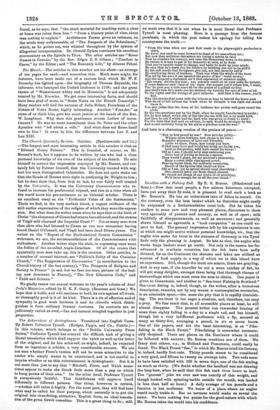The Church Quarterly Review. October. (Spottiswoode and Co.) —The longest
and most interesting article in this number is that on "Edward Henry Palmer." This is founded, of course, on Mr. Besant's book, but it appears to be written by one who had a close personal knowledge of his ow n of the subject of his sketch. He sets himself to correct the impression conveyed by Mr. Besant, and cer- tainly felt by Palmer himself, that the University treated with neg- lect her most distinguished Orientalist. He does not quite make out that the Heads of Houses were right in preferring Dr. Wright to him ; but he does show that, from first to last, he was fairly well treated by the University. It was the University Commissioners who re- fused to increase his professorial stipend, and this at a time when all the world knew his pm-eminence as an Oriental scholar. There is an excellent essay on the "Evidential Value of the Sacraments." There we find, in the very earliest times, a cogent evidence of the still earlier organisation of the religion of which they were the expres- sion. But what does the writer mean when he says that at the birth of Christ "the eloquence of Cicero had scarce been silenced, and the strains of Virgil still charmed the Imperial Court ?" Notes many men were then alive who had listened to Cicero as can now remember having heard Daniel O'Connell, and Virgil had been dead fifteen years. The writer on the "Report of the Ecclesiastical Courts Commission " welcomes, we see, the recommendations of the Commissioners with enthusiasm. Another writer slays the slain, in expressing once more the follies of the so.called Anglo-Israelism. Of all the crazes that apparently sane men take up, this is the craziest. Other articles, in a number of unusual interest, are "Pellicia's Polity of the Christian Church," "The Suppression of Convocation" (a contribution to the Church history of the last century), "The Prospects of Religion and Society in France" (a sad, but we fear too true, picture of the feel- ing now dominant in France), "The New Education Code," and "Faith and Science."


































 Previous page
Previous page